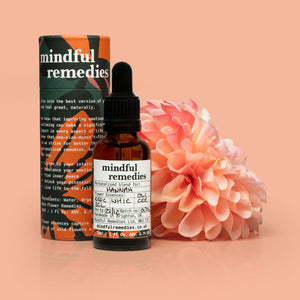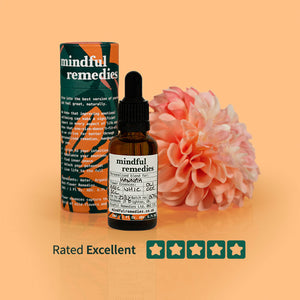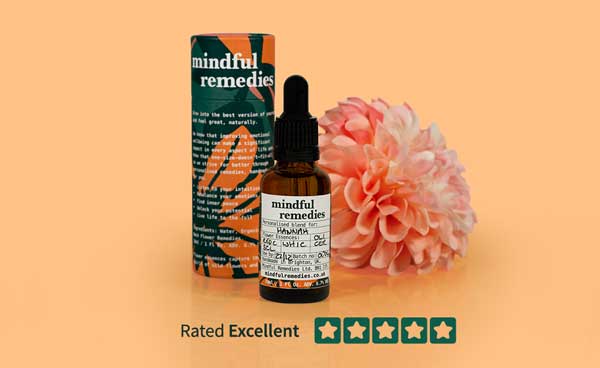your basket
- choosing a selection results in a full page refresh

Postnatal depression (PND), also known as postpartum depression, is a mood disorder that affects new mothers after childbirth. It is characterised by persistent feelings of sadness, hopelessness, and a general lack of interest or pleasure in daily activities. PND can occur within the first few weeks after delivery or develop gradually over the course of several months. It is crucial to recognise that PND is a real and common condition that requires attention and support.
When dealing with postnatal depression, you may want to explore treatment options. While conventional treatments such as therapy and medication can be effective, some women may prefer natural alternatives that minimise potential side effects and support their holistic health. One such natural treatment option for postnatal depression is Bach flower remedies. Developed by Dr. Edward Bach in the 1930s, these remedies are derived from the essences of specific flowers and plants. Bach flower remedies work on the principle that emotional imbalances contribute to physical ailments and that restoring emotional balance can positively impact overall wellbeing. With their gentle and non-invasive nature, Bach flower remedies have gained popularity as a potential solution for various emotional and mental health concerns, including postnatal depression. In the following sections, we will delve deeper into the understanding of postnatal depression and explore how Bach flower remedies can play a role in its treatment.
Postnatal depression is characterised by a range of emotional and physical symptoms that persist beyond the "baby blues" experienced by many new mothers. These symptoms may include intense feelings of sadness, tearfulness, irritability, loss of interest or pleasure, changes in appetite or sleep patterns, fatigue, difficulty bonding with the baby, feelings of guilt or worthlessness, and even thoughts of self-harm or harming the baby. It is important to note that these symptoms can vary in severity and duration for each individual.
Postnatal depression is more common than many people realise, affecting approximately 1 in 7 new mothers. It can occur in women of all backgrounds, regardless of age, culture, or socioeconomic status. Several risk factors contribute to the development of PND, including a history of depression or anxiety, a lack of social support, stressful life events, hormonal changes, difficulties in the mother-baby relationship, and a history of trauma or abuse.

Postnatal depression not only affects the mother's emotional wellbeing but also has a profound impact on the baby and the entire family. When a mother experiences PND, it can affect her ability to care for and bond with her baby. This may lead to disruptions in the mother-infant attachment, delayed cognitive and emotional development in the child, and increased stress within the family unit. It is crucial to address PND promptly to minimise its long-term effects on both the mother and the family as a whole.
Conventional treatments for postnatal depression typically involve a combination of psychotherapy and medication. Psychotherapy, such as cognitive-behavioural therapy (CBT) provides a supportive and safe environment for mothers to explore their thoughts, emotions, and challenges associated with PND. It helps them develop coping strategies, improve communication, and build resilience.
Medication, such as selective serotonin reuptake inhibitors (SSRIs), may be prescribed to alleviate depressive symptoms. SSRIs are commonly used as they are generally safe for breastfeeding mothers, although individual considerations and discussions with healthcare professionals are essential.
While conventional treatments can be effective for many women with PND, they are not without limitations and potential side effects. Medications may cause adverse reactions, interact with other medications, or have varying degrees of efficacy. Additionally, some women may be hesitant to rely on pharmaceuticals or medication or may experience concerns about potential long-term effects.
Therapy can also have its limitations, such as limited availability of qualified therapists or financial constraints. Furthermore, the time commitment and the need to travel to therapy sessions can be challenging for new mothers who already face time constraints and responsibilities.

Given the limitations and concerns associated with conventional treatments, there is a growing need for alternative and complementary approaches to postnatal depression. Many women seek natural treatment options that offer a holistic approach, taking into account their emotional, physical, and spiritual wellbeing. This is where Bach flower remedies can play a valuable role.
Bach flower remedies were developed by Dr. Edward Bach, a British physician and homeopath, in the 1930s. Dr. Bach believed that emotional imbalances were the root cause of many physical ailments and sought to create a gentle and natural system to restore emotional equilibrium. He identified 38 different flower essences, each associated with a specific emotional state, to address a wide range of emotional and mental health concerns.
At the core of Bach flower remedies is the belief that emotional disharmony disrupts the body's natural healing abilities. The essences, prepared from flowers and plants, work energetically to balance and harmonise emotions, allowing the body to heal itself. Rather than targeting specific symptoms, Bach flower remedies focus on addressing the underlying emotional imbalances that contribute to PND and other conditions.

Bach flower remedies work by gently influencing the subtle energies within the body, helping to restore emotional balance. The essences are typically taken orally allowing the body to absorb their energetic properties. The chosen remedies are personalised to match the individual's emotional state and can help alleviate specific feelings associated with postnatal depression, such as sadness, overwhelm, guilt, or anxiety. Bach flower remedies are considered safe, non-toxic, and non-addictive and are suitable for use during pregnancy and breastfeeding.
By addressing emotional imbalances and promoting emotional wellbeing, Bach flower remedies offer a complementary and natural approach to support women in their journey through postnatal depression.
When using Bach flower remedies for postnatal depression, it is important to identify the specific emotional states and symptoms that need to be addressed. Each Bach flower remedy corresponds to a particular emotional state, such as fear, sadness, guilt, or overwhelm. Take some time to reflect on your emotions. You may want to consult with a Bach flower practitioner who can guide you in choosing the appropriate remedies.
Keeping a journal or a symptom tracker can be helpful in recognising patterns and identifying the most prevalent emotions. This will allow you to select the remedies that best match your individual experience of postnatal depression. Below we go into details about some commonly used Bach flower remedies for PND.
Bach flower remedies are typically taken orally, and their dosage and administration methods are straightforward. If you’re working with multiple flower remedies combined in a bottle (as per Mindful Remedies products) you should take a minimum of 4 drops, 4 times a day. You can take more frequently if you feel you need to and it’s often helpful to start off taking more often. You can’t overdose on flower remedies.
It is important to note that Bach flower remedies are safe to use, even if you are breastfeeding. However, if you have any concerns or specific health conditions, it is advisable to consult with a healthcare professional to ensure the remedies are suitable for you.
There are several Bach flower remedies that can provide support and relief for mothers experiencing postnatal depression. These remedies are selected based on their ability to address specific emotional states and symptoms commonly associated with PND. At Mindful Remedies we offer the ability to craft your own personalised remedy, choosing up to 7 remedies in a bottle. Let's explore some of these remedies and their descriptions. If any of these remedies resonate with you, simply click on the buttons below to add them to your treatment bottle.
Mustard is recommended for those experiencing deep sadness or gloom without any apparent reason. It can help lift the heavy cloud of depression and restore a sense of inner light and joy. Mustard is particularly useful for mothers who feel a profound sadness or melancholy that seems to envelop them, impacting their ability to find pleasure or connect with their baby.
Gentian is beneficial for individuals who feel easily discouraged or demoralised or who are feeling despondent after a set-back. It can provide support in times of doubt, helping to restore faith, resilience, and a sense of optimism. Mothers with PND who experience feelings of discouragement, setbacks or a sense of despondency can find Gentian helpful in boosting their spirits and maintaining a positive outlook.
Gorse is recommended for individuals who have lost hope or feel a deep sense of despair. It can offer a ray of light, fostering renewed faith, optimism and a belief in the possibility of healing. For mothers struggling with intense feelings of hopelessness, Gorse can provide a sense of hope and renewal, helping them find strength and motivation to overcome their depression.

Sweet Chestnut is suitable for those experiencing extreme mental or emotional anguish. It helps bring solace, inner peace, and a sense of liberation. Mothers encountering profound emotional pain, feelings of desperation or a sense of being trapped can find comfort in Sweet Chestnut, allowing them to find inner peace and release from their suffering.
Pine is recommended for individuals burdened with guilt and self-blame. It helps foster self-forgiveness, self-acceptance and the ability to acknowledge one's efforts and achievements. Mothers struggling with guilt or self-doubt in relation to their role as a mother can find Pine helpful in alleviating these negative feelings and cultivating self-compassion, a sense of worthiness and be able to accept praise.
Star of Bethlehem is particularly useful for those who have experienced any form of trauma, including birth trauma and can be a natural treatment for PTSD. It helps bring comfort, healing, and a sense of inner peace. Mothers who have undergone a traumatic birth experience can find solace in Star of Bethlehem, as it aids in addressing the emotional wounds and restoring a sense of calm and recovery.
Walnut is known as the "emotional shield" remedy. It helps individuals adapt to change, protect their emotional wellbeing, and maintain their own sense of identity. Mothers going through the significant life transition of becoming a parent can benefit from Walnut, as it assists in adapting to the changes and challenges while maintaining a sense of stability and emotional resilience.
Crab Apple is the remedy for self-acceptance and self-care. It aids in letting go of self-judgment, promoting a sense of purity, and embracing oneself fully. Mothers who experience feelings of shame, inadequacy, or a strong need for cleanliness can find Crab Apple helpful in releasing self-criticism and nurturing a healthier self-image.
White Chestnut is recommended for calming a busy and restless mind. It promotes mental clarity, peace, and a break from repetitive and intrusive thoughts. Mothers struggling with racing thoughts, excessive worry, or an inability to quiet their mind can find White Chestnut beneficial in achieving a sense of mental calm and tranquillity. It’s also a very helpful sleep remedy for insomnia.
Red Chestnut is for individuals who experience excessive worry and fear for the wellbeing of others, especially their loved ones. It encourages trust and the ability to let go of anxious thoughts. Mothers who constantly worry about the health and safety of their baby or have excessive fear for their family members' wellbeing can find Red Chestnut helpful in alleviating these anxious thoughts and fostering a sense of trust and peace.
Postnatal depression is a challenging condition that requires effective and holistic treatment options. While conventional treatments have their merits, exploring natural and complementary approaches can provide additional support and promote emotional wellbeing for mothers. Bach flower remedies, with their gentle yet powerful effects on restoring emotional balance, offer a solution for postnatal depression.
By addressing specific emotional states and symptoms, Bach flower remedies can help mothers navigate the complex landscape of postnatal depression. From lifting the cloud of sadness with Mustard, to fostering resilience and optimism with Gentian, or finding solace and hope with Gorse, these remedies offer personalised support for individual experiences.
If you're interested in exploring Bach flower remedies further and creating a tailored remedy blend, consider creating a remedy through Mindful Remedies. We offer the opportunity to choose up to seven Bach flower remedies to be blended into a personalised bottle, handmade by a qualified Bach flower practitioner. Whether you're located locally or anywhere in the world, we can ship the remedy blend directly to your doorstep.
create a personalised remedy
For those seeking additional guidance, Lucy Edwards, the founder of Mindful Remedies, offers online consultations via Zoom. These consultations provide an opportunity to discuss your unique situation, receive personalised recommendations and gain valuable insights from a qualified Bach flower practitioner.
book a bach flower consultation
Remember, seeking support and finding the right treatment approach is crucial when dealing with postnatal depression. Bach flower remedies, in combination with other natural strategies and professional guidance, can contribute to your emotional well-being and help you on your journey towards healing and recovery. Don't hesitate to reach out and explore the potential benefits of Bach flower remedies in your postnatal depression journey.
Bach flower remedies can be used in conjunction with other natural treatment strategies to support your journey through postnatal depression. They can complement practices such as mindfulness, yoga, meditation, and exercise, which promote emotional wellbeing and overall mental health.
Additionally, seeking support from a therapist, counsellor or support group can provide valuable insights and guidance during this challenging time. The combination of Bach flower remedies with these approaches can create a comprehensive and holistic treatment plan, addressing the emotional, physical, and social aspects of postnatal depression.
Remember that self-care is essential in the postnatal period. Prioritise rest, nourishing food, and regular breaks to recharge. Engaging in activities you enjoy and spending quality time with loved ones can also contribute to your emotional wellbeing.
By integrating Bach flower remedies into your overall treatment plan and combining them with other natural strategies, you can create a supportive and comprehensive approach to managing postnatal depression and nurturing your overall wellbeing.

Since 2021, Lucy Edwards, a qualified Bach Flower Practitioner and the driving force behind Mindful Remedies, has connected with clients across the world. Crafting thousands of personalised remedies, Lucy has supported individuals' emotional wellbeing, shipping remedies to far-flung places like the USA, Thailand, and Australia.
Lucy is readily available for conversations, offering personalised advice to guide you on the path to holistic wellness. It's important to note that she's not only qualified but also registered with the Bach Centre, ensuring that every consultation and remedy adheres to Dr Bach’s original guidelines for expert care and efficacy.
Exclusive pricing 20% off your first subscription order and 5% off all future orders
VIP treatment Receive personalised advice from Lucy, free gifts & 15% off gift vouchers
Easy to manage Edit remedy, change schedule, pause or cancel at any time
Exclusive online workshops Access to workshops focusing on emotional wellbeing, guided by Lucy
Early access to new products Be the first to try out new remedies or wellness products, before anyone else



